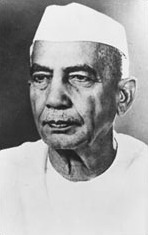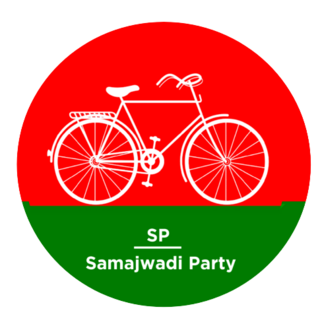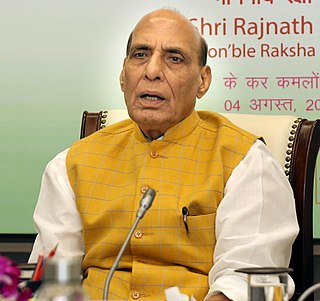
Chaudhary Charan Singh was an Indian politician and a freedom fighter who served as the 5th Prime Minister of India from 1979 to 1980 and the 3rd Deputy Prime Minister of India from January 1979 to July 1979. He served as 5th Chief Minister of Uttar Pradesh as a member of Bhartiya Kranti Dal. Charan Singh is known for his land and agricultural reform initiatives. He is widely regarded as the "Champion of farmers" after his life has been dedicated to advocating for the wellbeing and rights of farmers. He is the first leader outside the Indian National Congress who formed government in the northern India and became 5th chief minister of Uttar Pradesh.

The Samajwadi Party is a socialist political party in India. It was founded by formerly Janata Dal politician Mulayam Singh Yadav and is headquartered in New Delhi. The Samajwadi Party is currently led by former Chief Minister of Uttar Pradesh, Akhilesh Yadav. He was chosen as the President for the first time in an Emergency meeting in 2017. He was chosen for second time in 2017 at Agra Convention of Samajwadi Party. He was chosen for the third time at the party's national convention held in September 2022 at Lucknow.

Virbhadra Singh was an Indian politician who served 6 terms and 21 years as the 4th Chief Minister of Himachal Pradesh. A leader of the Indian National Congress party, he was elected 9 times as a Member of Legislative Assembly to the Himachal Pradesh Vidhan Sabha and 5 times as Member of Parliament to the Lok Sabha. Virbhadra Singh was popularly known by the honorific Raja Sahib. Singh holds the distinction of being the longest serving Chief Minister of Himachal Pradesh, holding the office from 1983 to 1990, from 1993 to 1998, from 2003 to 2007 and finally from 2012 to 2017, when he was succeeded by the BJP's Jai Ram Thakur. He was elected to the Lok Sabha in 1962, 1967, 1971, 1980 and 2009. Singh served as a Union Minister in the governments of Indira Gandhi and Manmohan Singh. At the time of his demise, he was serving as an MLA from Arki constituency.
Although India is a parliamentary democracy, the country's politics has become dynastic or with high level of nepotism, possibly due to the absence of party organizations, independent civil-society associations which mobilize support for a party, or centralized financing of elections. The dynastic phenomenon is present at the national, state, regional, and district level. The Nehru–Gandhi family has produced three Indian prime ministers, and family members have largely led the Congress party since 1978. The ruling Bharatiya Janata Party (BJP) also has several dynastic leaders. In addition to the major national parties, other national and regional parties such as Shiromani Akali Dal, Shiv Sena, Samajwadi Party, Rashtriya Janata Dal, Janata Dal Secular, Jharkhand Mukti Morcha, Dravida Munnetra Kazhagam, Kerala Congress, Jammu & Kashmir National Conference, Indian Union Muslim League, AIMIM, and the Nationalist Congress Party are all dominated by families, mostly those of the party founders.

Yogi Adityanath is an Indian Hindu monk and politician from the Bharatiya Janata Party who has been serving as the 21st and current chief minister of Uttar Pradesh since 19 March 2017. He is the longest serving chief minister of Uttar Pradesh, who is currently running his tenure for over six years, surpassing Sampurnanand.

Rajnath Singh is an Indian politician and lecturer who is serving as the 29th Defence Minister of India since 2019. He is currently the deputy Leader of the House, Lok Sabha since 2014. He was the 8th President of Bharatiya Janata Party from 2005 to 2009 and again from 2013 to 2014. He is a veteran leader of the BJP who started his career as a RSS Swayamsevak.
The Government of Uttar Pradesh is the subnational government of the Indian state of Uttar Pradesh with the governor as its appointed constitutional head of the state by the President of India. The Governor of Uttar Pradesh is appointed for a period of five years and appoints the Chief Minister of Uttar Pradesh and their council of ministers, who are vested with the executive powers of the state. The governor remains a ceremonial head of the state, while the chief minister and their council are responsible for day-to-day government functions.

The Representation of the People Act, 1951 is an act of Parliament of India to provide for the conduct of election of the Houses of Parliament and to the House or Houses of the Legislature of each State, the qualifications and disqualifications for membership of those Houses, the corrupt practices and other offences at or in connection with such elections and the decision of doubts and disputes arising out of or in connection with such elections. It was introduced in Parliament by law minister Dr. B.R. Ambedkar. The Act was enacted by the provisional parliament under Article 327 of Indian Constitution, before the first general election.

Mulayam Singh Yadav was an Indian politician, a socialist figure and founder of the Samajwadi Party. Over the course of his political career spanning more than six decades, he served for three terms as the Chief Minister of Uttar Pradesh, and also as the Union Minister of Defence in the Government of India. A long-time parliamentarian, he was a seven-time Member of Parliament representing Mainpuri, Azamgarh, Sambhal and Kannauj constituencies in the Lok Sabha, a ten-time member of the Legislative Assembly, member of the Legislative Council and the Leader of Opposition for several times as well. The veteran politician was a prominent figure of his time in Indian Politics, and was often referred to as Netaji and Dhartiputra by party leaders and workers. In 2023, the socialist leader was posthumously conferred with Padma Vibhushan, India’s second highest civilian award by the Government of India.

Keshav Prasad Maurya is an Indian politician, currently serving as the Deputy Chief Minister of Uttar Pradesh. He is a member of the Bharatiya Janata Party. Maurya was associated with a right-wing Hindu organization Rashtriya Swayamsevak Sangh, before entering active politics through BJP. He was also involved in cow protectionism in his early life. Before 2017 Uttar Pradesh Legislative Assembly elections, he was made state president of the BJP, and after the victory of BJP, he was appointed as Deputy Chief Minister of Uttar Pradesh in the first Yogi Adityanath Government. Maurya again contested the legislative assembly elections in 2022 from Sirathu Assembly constituency, losing to Pallavi Patel of Samajwadi Party. However, he was given a second term as Deputy CM in the second Yogi Adityanath government.
Kartar Singh Bhadana is an Indian politician and is a member of the Bahujan Samaj Party political party.
Uttar Pradesh Lokayukta and Uplokayukta is an anti-corruption ombudsman in the Indian state of Uttar Pradesh.The position of the Lokayukta was established under the Lokayukta Act of 1975. The Lokayukta is from a non-political background and functions as a statutory authority probing into cases primarily related to corruption, government mismanagement, or abuse of power by public servants or ministers. Though the Lokayukta lacks wide investigatory powers, it has caught public attention by investigating high-profile cases.











